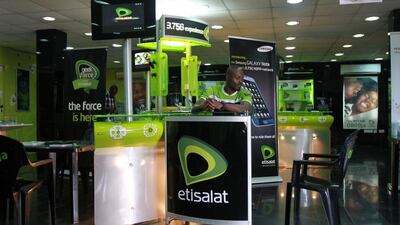Saudi Telecom Company and Etisalat topped a ranking of the top 30 most valuable Saudi Arabian and UAE brands, according to a new report released on Tuesday.
Telecoms operators and banks dominated the list of the 30 most valuable brands in the two countries compiled by the world's biggest advertising company, WPP, and its data management division Kantar. The sectors contributed 70 per cent, or $35 billion, of the combined brand value of $50bn of the top 30 firms.
“There are huge opportunities in the region for brands that can adapt to new and dynamic markets and meet fast-changing consumer needs,” said David Roth, chief executive of WPP EMEA and Asia.
The top 30 brands’ combined value is broadly equivalent to the annual gross domestic product of Jordan, the report said.
The ranking, which collected responses from more than 12,000 consumers, also used the company's own brand valuation methodology to analyse more than 300 consumer brands across 19 categories ranging from food to energy.
A YouGov survey in September had ranked Dubai carrier Emirates airline as the leading brand in the UAE when it comes to customer loyalty, followed by dairy producer Almarai, supermarket operator Carrefour, iPhone and Etihad Airways.
Saudi telecoms giant STC was deemed the most valuable brand, at $9.7bn. UAE telecoms provider Etisalat ($5.2bn), Saudi Arabia’s Al Rajhi Bank ($4.7bn), the UAE’s First Abu Dhabi Bank ($3.9bn) and airline Emirates ($3bn) completed the top five.
Other brands in the top 10 include Saudi Arabian dairy company Almarai ($2.8bn), National Commercial Bank ($2bn), retailer Jarir Bookstore ($1.9bn), UAE developer Emaar Properties ($1.8bn) and telecoms provider Mobily ($1.7bn).
The combined value of the four telecoms brands in the top 30 (STC, Etisalat, Mobily and du) contributes 35 per cent of the ranking’s total value.
Some 13 out of the 30 top brands are banks. Between them, they account for more than one-third of the combined total value, but the WPP report highlights that although consumers felt that many banks offer good service, “they are all quite similar”.
Abu Dhabi National Oil Company ranks 11th on the list, with a brand value of $1.7bn. Meanwhile, Saudi Arabia's online food ordering platform HungerStation, valued at $488 million, is the youngest brand in the list.
“We see brands that have a long history in the region, as well as new and upcoming brands that are influencing the way we live, shop, eat and travel,” said Amol Ghate, Middle East chief executive of Kantar's insights division.
“It’s an exciting time as new innovative brands collide with old, but what they have in common is a desire to meet the demands of a changing society. At the same time, brands have had to adapt quickly during the global pandemic to meet customer needs and support local communities at a time of crisis.”
There are no pure-play technology companies in the top 30 ranking. The dominance of global technology brands has meant there is little room for home-grown brands to emerge.
All of the brands had to meet certain eligibility criteria. The brand has to originate in the UAE or Saudi Arabia and it must be owned by an enterprise listed on a credible stock exchange or by a private enterprise with financial statements that are available in the public domain. For banks, a minimum of 30 per cent of operating income needed to be generated from their retail segment.


